- Home
- Alex Segura
Down the Darkest Street Page 2
Down the Darkest Street Read online
Page 2
“No. Not really,” he said. “I just stay at home. Read. I work at a bookstore on Bird Road a few times a week.”
“Well, listen,” Jack said. He pulled out a tiny notebook from his back pocket and wrote something on a sheet before tearing it off and handing it to Pete. “Here’s my number. Call me anytime. Even if you just want to chat. I know it can get weird out there.”
Pete noticed a flicker of sympathy cross the older man’s eyes. Jack nodded and smiled kindly before sidestepping Pete and heading out the way Pete had hoped to go earlier. Pete stood in front of the door, as if waiting for someone to sidle up to him and start a conversation.
But that didn’t happen, and he turned and left, taking the steps two at a time and almost working up a sweat before reaching the street. He was about a block from his house but he didn’t feel like going home. His cell phone rang. It was Emily, his ex-fiancée. She was moving in. Today. It was part of the reason Pete was at the meeting. The idea of Emily living in his house wasn’t exactly keeping him stress-free. It was complicated, to say the least. These things always were.
“Hello?”
“I put some boxes in the utility room,” she said. “They didn’t all fit in the guest room. Just wanted you to know.”
Pete frowned and thought before he responded. He had to tread carefully.
“Thanks for checking after the fact,” he said. He regretted the petty remark immediately.
“Well…” She paused. “OK. You’re right. I’m sorry. What are you doing? Are you coming home?”
“I’m going to work,” Pete said.
“Fine,” she said. “How was your meeting?”
“It was OK. The usual.”
The silence on the other end dragged for a few seconds too long. Pete waited. This relationship was emblematic of how his life was right now: uncertain, undefined, and somewhat tedious.
“Thanks for letting me stay at the house,” she said.
“You’re welcome,” Pete said, a bit surprised at her burst of gratitude and feeling a touch of guilt for being so quick on the draw. “What are friends for?”
“I’ll see you later,” she said and ended the call.
Pete looked at his phone for a second before sliding it back into his pocket.
He wasn’t going to work.
It took him a few minutes to reach the St. Brendan’s parking lot and find his car. He turned on the engine and AC and let the repackaged air flow through the vehicle, leaving the windows down for a few moments to try and cycle out the humidity that had accumulated while the car sat outside under a blistering sun.
He closed his eyes for a second and let his mind wander back to the meeting. Nothing really stood out to him as memorable, but he felt somehow cleaner, or more focused. He didn’t want to overthink it. He opened his eyes and looked over his hands. He still had a few scrapes and bruises from the brawl with the two guys four or five months back. And even that hadn’t been enough to make Pete hop on the wagon. He wasn’t sure what exactly got him out of bed and to a meeting that day.
The night before he quit had been like many others: a few drinks at lunch, meeting up with some friends amidst the fading glory of Coconut Grove for happy hour. The stretch of land near the ocean full of tourist-trap food and drinking spots had seemed much cooler to Pete when he was younger. Now it made him feel old—the college kids using their fake IDs to score Long Island Iced Teas and the cheesy bars with their faux Irish pub décor and fruity drinks. Every bar was packed and every drink was overpriced and every person seemed like someone’s idea of what was cool. Sad people pretending to be happy in the hopes of becoming happy with each other.
This was followed by a swerving twenty-minute drive to the neon lights and dirty streets of South Beach. Another round or five on the main strip, Lincoln Road—a pedestrian oasis in a town that forced even the blind and dead to drive. Where had they gone? Zeke’s, maybe? Or was it the Abbey again? The suggestion of karaoke. Another ill-advised drive farther down the beach. A few songs he remembered—“Scenes from an Italian Restaurant,” “Love Shack,” “Old Man.”
Strangely enough, the clearest memory Pete had of the evening wasn’t the early, sober stages but the very end, when he found himself squirming in a booth packed with people, all of them screaming and singing and gesticulating at each other. They were doing karaoke at the Shelbourne Hotel on Collins Avenue—an off-white building that had seen better days, but was still desperately clinging to the glitz and glory of a time no one remembered. They were in the hotel’s tricked out basement area drinking $15 rum and Cokes with a $10 chaser shot of something fruity and singing about Brenda and Eddie. In that moment, Pete realized he was totally alone. He didn’t know anyone around him. He wasn’t sure how he’d gotten to the bar, and he was even less sure about the girl whose hand he was holding. His head was already hurting—a residual hangover now snowballing into the next one, and he hadn’t showered since the morning before. What if I die here? he thought. He’d gotten up and stumbled to the shadowy men’s room—and had rested his hands on the sink. He scooped up a handful of water and splashed it on his face, letting it drip down his cheeks and chin. He didn’t care.
When he came to, probably a minute later, he was on the bathroom’s muted peach linoleum floor. His neck hurt. His legs were splayed out in front of him. A man wearing a dark striped shirt and a lot of gold jewelry was looking down at him as he washed his hands.
Pete started to look up, but felt his head spinning. He checked his shirt. Reflex. He hadn’t thrown up on himself.
“You all right, man?”
Pete tried to respond, but his tongue felt numb—as if he’d just shoved a bag of cotton balls into his mouth. Eventually, he croaked out a response.
“Do I look all right?” he said.
“Hey, just asking,” the guy said, raising his arms in mock defense, water splashing on Pete. “You should probably go home. Sleep it off. Press RESTART.”
“What?”
“RESTART, bro. You ever play Nintendo?”
“Yeah,” Pete said. “When I was a kid.”
“Your system ever freeze up on you, man? Like, it won’t take any games, won’t let you get past the level you want to get past?”
“Sometimes.”
“Well, sometimes you got no choice. You can’t take the game out, ’cause it’s stuck. You can’t use the controller because it’s jammed. All you can do is push that RESTART button, man. Then you’re back at square one. But shit, at least you’re moving, you know?”
Pete wasn’t sure what to say, if anything.
The man dried his hands and helped Pete to his feet.
“You take care of yourself, man,” he said as he tossed his used paper towel into the trash and walked off.
He’d made it home somehow, strangely sobered by the experience—at least, sober enough to sneak past his “friends” and to his car. He didn’t remember the drive home, or the moments before he passed out again, this time on his couch. The next day, he’d done a quick web search and found the nearest AA meeting.
The memory of his “bottom”—or lowest point—was a mixed bag of shame, anxiety, and optimism for Pete. He considered this for a second as he pulled his car out of the parking lot. He turned the radio on loud, trying to drown out his thoughts. The playlist popped on mid-song. Pavement’s “We Dance.” Pete hummed along as he hopped onto the 836 heading west, toward Coral Gables—about a twenty-minute drive with no traffic. From middle-class bliss to hoity-toity excess. The drive—once Pete hopped off the exhaust-coated wasteland that was the 836 expressway and returned to Coral Way—was scenic and transformative. The office parks and giant grocery stores were slowly replaced by carefully landscaped trees and lawns, which surrounded large mansions and the gigantic landmark that is the Biltmore Hotel. This was old Miami, classic, historic, with a coat of paint over something darker and more dangerous.
The sun was shining and the sky was cloudless. Another perfect Miami afternoon. He
squinted as he drove, his sunglasses still in the glove compartment. He wondered how long Emily would be staying with him. If she and her husband, Rick, would be able to work things out. If things could be worked out after what had happened between them. He wasn’t sure how he felt about seeing her at all. Before Rick, she’d been engaged to Pete, and if not for Pete’s drinking and the death of his father, they might still be together. After the events of the last year, they’d managed to revive an uneasy friendship, and Pete had been hopeful they could at least remain polite and work from there. He hadn’t expected her marriage to implode. Even less expected was that she’d turn to him for a place to stay while she “sorted things out.” He didn’t press the question—the best thing he could do was to be there for her, for once.
He didn’t allow himself the nostalgic rides through past relationships as often as he had when he was drinking. The whiskey-coated memories of his engagement to Emily were now harder to revisit, and less romantic. But there was no denying he still had a connection with her, and a longing for her. His mind and body—and heart—were not cut out to be dealing with this now.
The playlist wound down—silence replaced the final chords of Sleater-Kinney’s “Let’s Call It Love.” The song—long, loud, emotional, and ragged—fit Pete’s mood. He felt raw. He felt alone. But he also felt alive for the first time in years. He turned the car onto Giralda, a small street off Miracle Mile. He was in the heart of Coral Gables, surrounded by townie shops and franchise restaurants. He drove for a few minutes and turned into a cramped parking lot next to an overpriced Thai restaurant. He got out of the car and locked the door. He walked across the street, looking around. He pushed open the main door to the bar—aptly called The Bar—and walked in.
It was dark, in contrast to the bright, sunny, living world outside. The place was empty, too. The bartender, an older woman named Lisa who often worked the day shift, was wiping down the counter. She looked up at him and nodded before she went back to cleaning. Pete slid into a stool at the counter and cleared his throat. Before he could speak, a pint glass of Bass ale was placed in front of him. Lisa lingered for a second before moving across the bar to wipe down the other side.
Pete turned the pint slowly, admiring the amber liquid, watching carefully as it jostled around the glass. He moved his hand back and reached for his wallet. He pulled out the photo with care, unfolding it as if in slow motion. It was about three years old.
“You gonna drink it?” Lisa yelled from the kitchen, out of sight. “Or just stare at it, like usual?”
Pete didn’t respond. He placed the photo flat on the bar next to the glass, careful not to get it wet or dirty. The photo was dark and out of focus, taken in a watering hole like a million others—possibly the one Pete was sitting in. It was Pete and his friend Mike. Happier times. Their eyes were both at half-mast, always a sign of a good night. Pete’s arm wrapped around Mike. He didn’t remember many of the details of that specific evening; the picture was one of the few he had of his friend.
His memories were invaded by the vision of a car enflamed. A funeral. His best friend caught up in a mess of Pete’s creation. A mess that cost others their lives, too. He let out a long sigh as his fingers wrapped around the glass of beer. It would be so easy, he thought. Just pull it closer and take a sip. It wouldn’t have to be like the last time. Or the time before that.
He let go of the pint glass and pushed the thought out of his head. He set the photo on the bar. The creaking gears inside the jukebox began to grind together.
CHAPTER FOUR
The Book Bin was a small used bookstore on Bird Road, caught between a Checkers cheeseburger joint and Antonia Nunez’s real estate office. It was cold, cramped, overstocked, and smelled of paper, wood, and age. Pete liked being there. In a town where everything seemed to be a long drive away, the fact that the Bin was near his house also helped.
He pulled his car into the parking lot and grabbed his tattered copy of The Shining from the passenger seat as he got out. Pete felt like his entire life these days fell under “spare time.” He got a lot of reading done. A couple of books a week. Working at the store involved plenty of sitting around and reading. Every few hours someone would wander in—some looking for a specific book, others asking if they had a greeting card section or sold coffee. The job was relaxing but left a lot of time for thinking. Pete didn’t like thinking too much.
The sound of chimes greeted him as he entered. The place was empty, which was pretty standard for early in the afternoon. Pete took his seat behind the register and opened his book. A few minutes later he heard whistling.
Pete raised his head from the book as Dave Mendoza stepped into the main foyer/register area, his burly body passing with minimal grace through the narrow aisles which were bloated with paperbacks and dusty hardcovers—the bookshelves looking like they’d cave into each other with but a tap. Pete couldn’t help but smile as his friend came into view: Thin Lizzy T-shirt, large round sunglasses worn indoors, and beard more out of control than usual.
Dave ran the Book Bin. It was a little pet project his parents had left him when they realized that, despite their best efforts, the Bin would never be a huge earner on par with some of their more lucrative investments—like fusion restaurants on Lincoln Road or twenty-four-hour Laundromats. For Dave’s parents, a nonstarter was not an option. But the chance to give their burnout son something to do? An acceptable loss.
They left him alone and he didn’t sink the store. The agreement had held firm for a few years. Barely.
Dave was carrying a stack of romance paperbacks a few books too high when he turned to Pete as if he’d just realized his friend was there. He stopped whistling and dropped the stack on the floor. He walked toward Pete, his left hand raised for a high-five.
Pete responded in kind, and smiled.
“Sup, brofus?” Dave said, scratching at his puffy beard. “Didn’t think you were in today.”
“I’m not,” Pete said, leaning back in his seat. “But I figured you could use some time off. Y’know, give you a break.”
Dave shrugged. “Man, I haven’t had anyone walk in once today. But, hey, whatever, dude,” he said, turning and picking up some of the paperbacks splayed on the floor. “Mi casa, tu casa. Just don’t bill me for too many hours. You know how weird my dad gets.”
Pete nodded. He sometimes forgot Dave was at least five years younger than him, despite the beard, cloud of weed smoke, and slight potbelly.
Dave was one of those guys Pete had known of for years—they ran in the same circles and seemed to know a lot of the same people. But it wasn’t until about six months ago that they became what Pete would consider friends. Pete had popped into the Book Bin to kill time—during one of his attempts at staying sober that didn’t stick—and Dave recognized him. They got to talking and Pete left with a part-time job offer and a new friend—the latter being in short supply.
“I’ll do the usual,” Pete said. “I just needed to get out of the house.”
Dave turned, eyebrows slightly raised.
“Emily moving in making you feel strange?”
“Nah, it’s fine.”
“Dude, dude—seriously. It’s OK,” Dave said. “I mean, I get the appeal—Emily’s great. Smart, funny, pretty. Total package. But there’s history there, bro. You guys have baggage. And she’s a mess right now. Just sayin’ you can talk to me whenever.”
“I know. It’s all good.”
“Don’t know how you do it, man.”
“Do what?”
“Letting a woman that did you so wrong move in with you,” Dave said, looking over each paperback as he picked them up, re-forming the stack from earlier. “Can’t be good for your cabeza.”
Pete shrugged and let his attention return to the book. He longed for some music. The stereo at the Bin had blown out a few days before, the victim of one final, epic Rush marathon, courtesy of Mr. Dave Mendoza. A meticulously curated playlist explored at full volume. Pete was thankful whe
n the speakers drowned out Geddy Lee with their own shrieking death wail before conking out for good.
“You read the paper this morning?”
“You know I don’t read the newspaper,” Pete said, not looking up from the book.
“Yeah, I know,” Dave said. “But did you check it on the Internet or some shit? Do you try to keep up with the wild world around us?”
“What’re you getting at?”
“Some girl’s been missing for a few weeks—maybe more,” he said, flipping through the pages of another used paperback. It featured a long-haired, bare-chested man pulling a woman to him. She seemed OK with that. “Went to Dadeland to shop with her friends, never came home. Weird, huh?”
“Stop.”
“Stop what?”
“This,” Pete said, putting his book down, open-faced, on the counter. “Giving me a headline or news bit and trying to get me to involve myself. I don’t do that.”
“You do, though,” Dave said, wiping his index finger on a shelf and checking the dust. He didn’t seem pleased at what he found. “You used to investigate stuff for work, right? Hell, even after all this psycho killer stuff, you took some random cases.”
“Every blue moon, when I need cash. Never anything serious. Cheating husband, stuff like that. It wasn’t for me. The only one that was close to being a ‘case’ was a complete disaster,” Pete said. The case—which involved a lawyer friend enlisting Pete to help find a missing child—had ended in tragedy, and cemented Pete’s belief that dabbling as a detective might not be the best idea, even if the work gave him an unexpected rush and meshed with skills he’d honed before. Even worse, it all went down when Pete found himself spiraling further down into his own private, alcohol-fueled hell. It was a few weeks after the case ended that Pete found himself on the floor of the Shelbourne Hotel bathroom after a bad round of karaoke. “I don’t even have a license for that kind of shit.”
Dave didn’t respond. He’s annoyed, Pete thought.
“Look, I’m not a detective. I don’t want to be one. We’ve been over this. Can we just let it drop?”

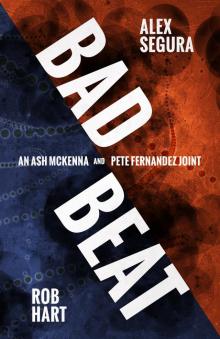 Bad Beat
Bad Beat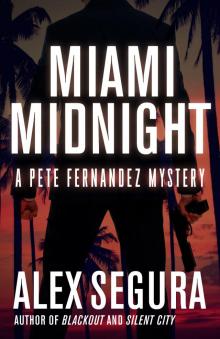 Miami Midnight
Miami Midnight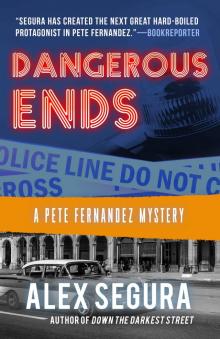 Dangerous Ends
Dangerous Ends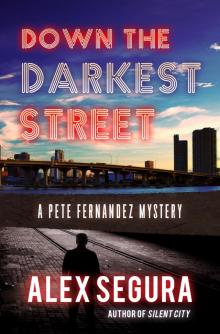 Down the Darkest Street
Down the Darkest Street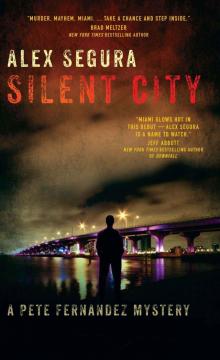 Silent City
Silent City